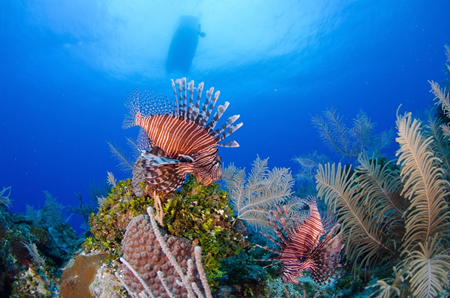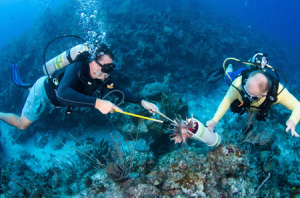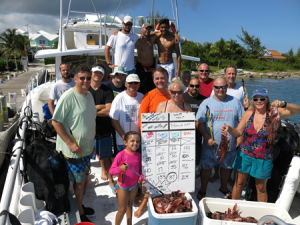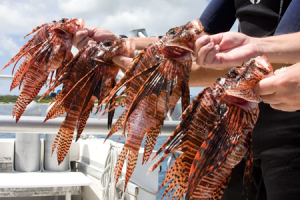Marine Life & Conservation
The Lionfish Kings of Grand Cayman’s East End

“Lionfish are beautiful, resilient and strong – a cool fish – but they are deadly to our reefs and if we don’t stop them something bad is going to happen,” says Matt Russell, a divemaster/instructor at Ocean Frontiers who has watched the invasion with deep concern for the marine environment. Russell is a dedicated, educated and skilled warrior in the fight against the predatory Lionfish, consistently culling large numbers on dives – a record 56 fish during a 2-tank dive. He’s also a member of the very exclusive “30 Club” whose members have removed 30 or more Lionfish on a single dive. Matt also teaches customers how to safely and humanely remove the invasive species from the reefs.
 “The hunt was wickedly fun at first, but now I feel an obligation to get as many people involved as I can,” he says. Matt and his co-workers follow the lead set by their boss Steve Broadbelt (also a member of the 30 Club) who is out there hunting and spearing as many Lionfish as he can on company culls. “We’re pretty competitive! Steve ‘gets it’ and understands that we need to keep the pressure on.”
“The hunt was wickedly fun at first, but now I feel an obligation to get as many people involved as I can,” he says. Matt and his co-workers follow the lead set by their boss Steve Broadbelt (also a member of the 30 Club) who is out there hunting and spearing as many Lionfish as he can on company culls. “We’re pretty competitive! Steve ‘gets it’ and understands that we need to keep the pressure on.”
This attitude and the resulting teamwork is why Ocean Frontiers is winning the local battle against invasive Lionfish prowling the reefs at East End, if not the broader war against the predator. Broadbelt and his team aggressively press on, culling as many predators as they can, and encouraging locals and customers to get involved in the fight. In March they crossed an important thresh hold – they have removed 10,000 Lionfish from East End reefs since they began culling three years ago.
Also this month their best customer for the fish, Chef Ron Hargrave, who operates Tukka at East End and Eagle Ray’s Dive Bar & Grill at Compass Point Resort, calculates that he has purchased 6000 pounds of Lionfish at a cost of $25,000. This partnership between Broadbelt and Hargrave is an example of how the community can help fight the Lionfish invasion, and it exemplifies the hope behind the mantra being repeated across the Caribbean: to beat them eat them.
Culling invasive Lionfish is a day in, day out challenge, and while eradicating them completely from Cayman’s reefs is unlikely, Ocean Frontiers is hoping to keep the predator population manageable at East End dive sites. Once a week, Ocean Frontiers runs a one-tank afternoon cull, and customers are asked to help by being Lionfish spotters for trained cullers. This helps keep the Lionfish population low on regular dive sites, but a more aggressive approach is needed for other areas of the reef not regularly dived. Ocean Frontiers also offers an all-day 3-tank cull once a month for Cayman residents who are licensed to use spears and have their own DoE approved spears. The dive operation also offers a culling class, taught by Matt Russell, for customers interested in being trained and licensed to spear Lionfish.
 “These trips target the hard to reach areas that are too far to get to on a typical half day trip,” says Broadbelt. “We’ve also developed what we call ‘parachute drop culling’ where we split the residents into three teams and drop them off along the reef sequentially the estimated distance apart that they are expected to cover. This enables us to cull over 1 mile of linear reef at a time and has resulted in many top scores. This method can only be used in the right conditions with advanced divers that we are comfortable with… I would class it as an extreme dive, but worth the results.”
“These trips target the hard to reach areas that are too far to get to on a typical half day trip,” says Broadbelt. “We’ve also developed what we call ‘parachute drop culling’ where we split the residents into three teams and drop them off along the reef sequentially the estimated distance apart that they are expected to cover. This enables us to cull over 1 mile of linear reef at a time and has resulted in many top scores. This method can only be used in the right conditions with advanced divers that we are comfortable with… I would class it as an extreme dive, but worth the results.”
The numbers tell the story: to date Ocean Frontiers has culled a total of 10,202 Lionfish; 1008 divers have participated in culling dives; the most fish ever culled in one day is 320; the most culled by a single diver in one dive is 39; the longest Lionfish caught is approximately 13 inches measured from nose to base of tail; the smallest is about 2 inches. Everything is carefully documented and the results are reported to the Department of Environment where a Lionfish database is kept.
Chef Ron Hargrave takes all the Lionfish being harvested at East End, no matter the size, and adds them to his menu. He says most of their customers are aware of the issue and support the cause by ordering at least one Lionfish dish – among the most popular are the famous Lionfish Tacos served at Eagle Ray’s Dive Bar & Grill.
 “Customers love it! And why not… Its delicate, flakey, white meat is very mild and extremely tasty,” he says, adding that demand is going up all the time.
“Customers love it! And why not… Its delicate, flakey, white meat is very mild and extremely tasty,” he says, adding that demand is going up all the time.
“The Lionfish tacos at Eagle Ray’s are probably the best I’ve ever had and they are on the menu 100% of the time,” says Matt Russell who often recommends them. “I’ll ask customers ‘did you try those fish tacos? I caught them!’”
Steve Broadbelt says licensed local cullers joined the fight once they understood the threat posed by the Lionfish, and they continue to be involved.
“Divers do not like harming or killing (culling) marine life, but we have to be smarter than our emotions and understand the damage the Lionfish are doing and the importance of our environmental work,” he says. “We employ some of our own techniques to make sure the Lionfish are terminated as quickly and humanely as possible. There is no reason to make them suffer – they are just not welcome here.”
“You have to take care of the things you love and there are few things I love more than Cayman’s reef life,” says local customer Mark Rovner, a licensed spearer. “At first I was apprehensive about killing fish, but once you understand the horrific damage these invasives can do, you realize there’s no choice. And if not me, who?
Broadbelt says getting Ocean Frontiers customers involved in culling is easy when they become aware of the threat Lionfish pose and sometimes a little competition keeps the hunt interesting.
 “We make the culling trips fun and competitive by encouraging a little rivalry and team spirit,” he says. “Most divers don’t need motivation. They care about the environment and there is always this desire to do a good thing and help with the problem. Some of them just love it and can’t get enough.”
“We make the culling trips fun and competitive by encouraging a little rivalry and team spirit,” he says. “Most divers don’t need motivation. They care about the environment and there is always this desire to do a good thing and help with the problem. Some of them just love it and can’t get enough.”
Is regular culling it working? Broadbelt says the data they’ve collected and submitted to the Department of Environment indicates that Lionfish counts and sizes are being reduced. Customers are also seeing fewer of them during dives on return trips.
“When I started, the lionfish populated almost every dive site. Now it is a surprise to see a lionfish,” agrees regular customer John Sharp who has participated in culling dives.
“Yes culling is making a difference, but it is like a leaking boat,” says Steve Broadbelt. “Every time we bail out some water… more just keeps coming back in. We can keep bailing and bailing, but we have to find a better long term solution.”
For more information on Ocean Frontiers, visit www.oceanfrontiers.com.
Blogs
Invitation from The Ocean Cleanup for San Francisco port call

6 years ago, The Ocean Cleanup set sail for the Great Pacific Garbage Patch with one goal: to develop the technology to be able to relegate the patch to the history books. On 6 September 2024, The Ocean Cleanup fleet returns to San Francisco bringing with it System 03 to announce the next phase of the cleanup of the Great Pacific Garbage Patch and to offer you a chance to view our cleanup system up-close and personal.
We look forward to seeing you there.
To confirm your presence, please RSVP to press@theoceancleanup.com
PROGRAM
Join The Ocean Cleanup as our two iconic ships and the extraction System 03 return to San Francisco, 6 years and over 100 extractions after we set sail, to create and validate the technology needed to rid the oceans of plastic.
Our founder and CEO, Boyan Slat, will announce the next steps for the cleanup of the Great Pacific Garbage Patch. Giving you a chance to view our cleanup system and the plastic extracted.
Hear important news on what’s next in the mission of The Ocean Cleanup as it seeks to make its mission of ridding the world’s oceans of plastic an achievable and realistic goal.
Interviews and vessel tours are available on request.
PRACTICALITIES
Date: September 6, 2024
Press conference: 12 pm (noon)
Location: The Exploratorium (Google Maps)
Pier 15 (Embarcadero at Green Street), San Francisco, CA
Parking: Visit The Exploratorium’s website for details.
RSVP: press@theoceancleanup.com
Video & photo material from several viewing spots around the bay
We look forward to seeing you there!
ABOUT THE OCEAN CLEANUP
The Ocean Cleanup is an international non-profit that develops and scales technologies to rid the world’s oceans of plastic. They aim to achieve this goal through a dual strategy: intercepting in rivers to stop the flow and cleaning up what has already accumulated in the ocean. For the latter, The Ocean Cleanup develops and deploys large-scale systems to efficiently concentrate the plastic for periodic removal. This plastic is tracked and traced to certify claims of origin when recycling it into new products. To curb the tide via rivers, The Ocean Cleanup has developed Interceptor™ Solutions to halt and extract riverine plastic before it reaches the ocean. As of June 2024, the non-profit has collected over 12 million kilograms (26.4 million pounds) of plastic from aquatic ecosystems around the world. Founded in 2013 by Boyan Slat, The Ocean Cleanup now employs a broadly multi-disciplined team of approximately 140. The foundation is headquartered in Rotterdam, the Netherlands, and opened its first regional office in Kuala Lumpur, Malaysia, in 2023.
Find out more about The Ocean Cleanup at www.theoceancleanup.com.
Marine Life & Conservation
SHARK MONTH ARRIVES AT ROYAL WILLIAM YARD, PLYMOUTH

A shark has been spotted approaching Royal William Yard in Plymouth, much to the surprise of swimmers, paddleboarders and onlookers.
With its distinctive dorsal fin cutting through the water, the sizeable shark swam along the coastline, before turning to head inland towards Firestone Arch at Royal William Yard. The appearance drew a crowd, who were captivated for more than an hour by the unusual sight – and it was all caught on video.
The shark is one of many expected sightings at Royal William Yard over the coming weeks… because today marks the start of Shark Month!
In reality, the ‘shark’ spotted along the Plymouth shoreline was actually a custom-made model, created by the team at Royal William Yard and sailed underwater by Caroline Robertson‑Brown from the Shark Trust, who donned scuba diving gear for the occasion.
The stunt took place to launch Shark Month in style and draw attention to the work of the leading international conservation charity, which is based in Britain’s Ocean City. Spectators were reassured that the water was safe and many entered into the spirit of the performance, swimming or sailing alongside the shark.
Shark Month will take place across Royal William Yard throughout July and will feature an extravaganza of art, entertainment and advocacy for everyone to enjoy. The packed programme of events starts with an art exhibition and ends with a trip on paddleboards with shark experts – with everything from a shark quiz to a Jaws screening in between.
Paul Cox, CEO of the Shark Trust, said: “There are often assumptions and misconceptions when it comes to sharks. This was certainly the case with the shark spotted at Royal William Yard! While the British coastline is home to many species of shark, this was not one of them. However, we’re thrilled it caught people’s attention, because seeing a shark is a special and memorable moment. That is precisely why we want to celebrate these incredible creatures, highlight the need for conservation, and ask for help to safeguard their future.”
For more information about Shark Month at Royal William Yard, visit the Shark Trust Website.
Images and video: Jay Stone
-

 Blogs2 months ago
Blogs2 months agoDiving With… Nico, Ocean Earth Travels, Indonesia
-

 News1 month ago
News1 month agoMurex Bangka Announce New Oceanfront Cottages & Beachfront Dining
-

 Blogs2 months ago
Blogs2 months agoA new idea in freediving from RAID
-

 Marine Life & Conservation1 month ago
Marine Life & Conservation1 month agoIceland issue millionaire whale hunter a licence to murder 128 vulnerable fin whales
-

 Marine Life & Conservation2 months ago
Marine Life & Conservation2 months agoThe Shark Trust Great Shark Snapshot is back
-

 News3 months ago
News3 months agoCharting New Waters; NovoScuba Goes Global with the Launch of their Revolutionary Dive Training Agency!
-

 Gear News1 month ago
Gear News1 month agoNew Suunto Ocean – a dive computer and GPS sports watch in one for adventures below and above the surface
-

 Marine Life & Conservation Blogs2 months ago
Marine Life & Conservation Blogs2 months agoBook Review: Plankton
















